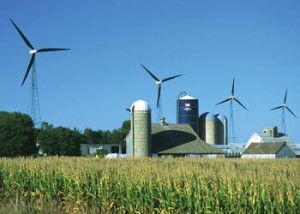Posts Tagged ‘Tom Vilsack’
Monday, August 22nd, 2011
Agriculture Secretary Tom Vilsack has announced grants for more than 900 agricultural producers and rural small businesses across the country to implement renewable energy and energy efficiency measures in their operations. Secretary Vilsack made the announcement as part of President Obama’s rural economic bus tour in the Midwest where he highlighted efforts underway to reduce our country’s dependence on foreign oil, which will increase the economic competitiveness of rural America and promote job creation.
 U.S. Secretary of Agriculture Tom Vilsack “These investments enable our farmers, ranchers and rural small business owners to develop renewable energy systems and make energy efficiency improvements that will save them thousands of dollars in energy costs each year,” Vilsack said. “This funding is an important part of the Obama Administration’s plan to conserve natural resources, create jobs and lead our country on the path to becoming more energy independent.”
The grants are being provided through the Rural Energy for America Program (REAP), a 2008 Farm Bill initiative. REAP offers funds for farmers, ranchers and rural small businesses to purchase and install renewable energy systems and make energy-efficiency improvements. These federal funds leverage other funding sources for small businesses. In all, USDA announced more than $11.6 million in energy grants today.
According to Molly Lambert, USDA State Director for Rural Development, “The REAP program is helping many agricultural producers and rural small businesses reduce energy consumption.” For example, Larry Moore of Loudon, NH, was selected to receive an $5,862 grant to make energy-efficiency improvements to his maple sugaring operations, included in these improvements is the installation of an in series 2000 gph reverse osmosis system which is designed to increase energy efficiency by removing water from the sap prior to boiling.
Main Street Properties of Warner, LLC, located in Warner, NH will use an $18,625 grant to install an 11.25kw photovoltaic system that will generate solar electricity for their real estate management business. The pole mounted solar system will offset 65 percent of the annual energy consumption.
Scenic Nursery & Landscaping, Inc will use their $16,500 grant to install a 10kw photovoltaic solar system to replace electricity, The installation of the solar system is expected to generate 14,296 kHw of electricity.As a result, this project will significantly reduce the applicants reliance on fossil fuel based electricity and help to retain 8 jobs.
Funding of each award is contingent upon the recipient meeting the conditions of the grant agreement. Grants can finance up to 25 percent of a project’s cost, not to exceed $500,000 for renewables, $250,000 for efficiency. For a complete listing of Rural Energy for America Program grant recipients announced today, please click here.
USDA, through its Rural Development mission area, administers and manages housing, business and community infrastructure and facility programs through a national network of state and local offices. Rural Development has an existing portfolio of more than $155 billion in loans and loan guarantees. These programs are designed to improve the economic stability of rural communities, businesses, residents, farmers and ranchers and improve the quality of life in rural America.
Tags: Larry Moore, Main Street Properties, Molly Lambert, President Obama, REAP, Rural Energy for America Program, Scenic Nursery & Landscaping, Tom Vilsack, USDA Rural Development
Posted in NH Business Matters | Comments Off on NH Awarded $41,000 for Solar and Energy Efficiency Projects
Wednesday, May 11th, 2011
Agriculture Secretary Tom Vilsack has invited agricultural producers and rural small businesses to apply for loans and grants to implement renewable energy systems and make energy efficiency improvements.
 In addition, the program also provides funding to complete feasibility studies for renewable energy generation systems and energy efficiency improvements. For information on how to apply for assistance, contact Steven Epstein in the Concord, New Hampshire office at 603-223-6041. The deadlines for submitting completed REAP applications are June 15 and June 30, depending on the type of project to be funded. In addition, the program also provides funding to complete feasibility studies for renewable energy generation systems and energy efficiency improvements. For information on how to apply for assistance, contact Steven Epstein in the Concord, New Hampshire office at 603-223-6041. The deadlines for submitting completed REAP applications are June 15 and June 30, depending on the type of project to be funded.
“Biomass, biofuels and other renewable energy sources present an enormous economic opportunity for rural America and the rest of the nation,” Vilsack said. “President Obama and I recognize that we need to win the future by implementing a long-term strategy to meet our country’s current and long-term energy needs. The funding I am announcing today will help make America’s farmers, ranchers and rural businesses more energy efficient.”
Since Rural Development’s renewable energy and energy efficiency programs were launched in 2003, they have played a key role in helping more than 6,000 businesses nationally create jobs and make energy efficiency improvements. Under REAP, local businesses receive assistance to deploy wind, solar and other forms of renewable energy as well as implement energy efficiency projects.
Locally, Wagner Forest Management of Lyme, New Hampshire took advantage of a REAP grant and loan guarantee combination to finance the installation of a solar electric generation system to offset 33% of their company’s office building electrical needs.
Tom Colgan, President of Wagner stated that, “I was very pleased to work with the USDA on our system financing needs. Now that the system is up and running we love it—particularly on the days when the sun is shining!” Christopher Bessette of Yankee Farm Credit in White River Junction provided the loan portion of the financing while USDA RD provided a grant and loan guarantee to Farm Credit.
USDA is providing funding for up to $61 million in guaranteed loans and $42 million in grants through the Rural Energy for America Program (REAP). Funds are available to help agricultural producers and rural small businesses develop renewable energy systems, make energy efficiency improvements and conduct studies to determine the feasibility of renewable energy systems.
USDA, through its Rural Development mission area, administers and manages housing, business and community infrastructure and facility programs through a national network of state and local offices. These programs are designed to improve the economic stability of rural communities, businesses, residents, farmers and ranchers and improve the quality of life in rural America. Rural Development has an existing portfolio of nearly $149 billion in loans and loan guarantees. Visit http://www.rurdev.usda.gov for additional information about the agency’s programs or to locate the USDA Rural Development office nearest you.
Tags: Christopher Bessette, President Obama, REAP, Steve Epstein, Tom Colgan, Tom Vilsack, USDA Rural Development, Wagner Forest Management, Yankee Farm Credit
Posted in NH Business Matters | Comments Off on Rural Energy for America Program Applications Invited
Tuesday, June 8th, 2010
It was great to see that our friends over at Miles Smith Farm are amongst the recipients of a USDA grant for NH agricultural producers. For those of you who don’t remember, Miles Smith Farm was the setting for our “matador” video (http://www.youtube.com/watch?v=67wY7FiuiDE) that hailed the beginning of this very blog. Congrats to Carol and Bruce as well as to Poverty Lane Orchards and The Big Farm.
Agriculture Secretary Tom Vilsack announced that USDA has selected recipients in 45 states and Puerto Rico, including three New Hampshire agricultural producers, to receive business development assistance and pursue marketing opportunities for agricultural commodities. Funding is made available through USDA Rural Development assistance under the Value-Added Producer Grant (VAPG) program, which was authorized in the 2008 Farm Bill.
 “These grants provide the capital resources necessary for business growth and job creation in rural New Hampshire,” said Molly Lambert, USDA Rural Development State Director. “Through these investments USDA is strengthening the economic foundation of rural New Hampshire.” “These grants provide the capital resources necessary for business growth and job creation in rural New Hampshire,” said Molly Lambert, USDA Rural Development State Director. “Through these investments USDA is strengthening the economic foundation of rural New Hampshire.”
For example, Poverty Lane Orchards, in Lebanon, plans to use their $100,000 grant to expand their craft finished fermented cider into new markets. The cider is fermented from specialized apple varieties grown in the Northeast. Poverty Lane Orchards boasts a large planting of English, European, and New World cider apples, many of which are not edible fresh. Once fermented the cider apples provide a stunning cider blend.
“We are blown away to be selected as a grant recipient,” said Louise Spencer, one of the proprietors of Poverty Lane Orchards. “This grant will help us to identify market distribution areas throughout New Hampshire, Western Massachusetts, and parts of New York State where we can expand production and distribution and serve as a model for others in this industry.”
In Madison, The Big Farm, a 21 flock dairy sheep operation owned and operated by Paul Priestman, will use a $15,000 grant for working capital to hire additional labor to produce on-farm sheep’s milk cheese. Priestman, a Beginning Farmer, also plans to use this grant to market and sale in expanded areas, yielding a higher per pound value for their liquid milk to high quality finished cheese product.
Miles Smith Farm in Loudon, owned by Carol Soule and Bruce Dawson, is receiving a $64,950 grant for economic planning activities—conducting a feasibility study, establishing a business and marketing plan for developing precooked, frozen, packaged meatballs from boneless, underutilized cuts of high quality beef. This small family farm raises ‘free range’ Scottish Highland Cattle, which produce lean and tender beef without hormones or growth stimulants.
Tags: Bruce Dawson, Carol Soule, Louise Spencer, Miles Smith Farm, Molly Lambert, Poverty Lane Orchards, The Big Farm, Tom Vilsack, USDA Rural Development, VAPG
Posted in NH Business Matters | Comments Off on NH Agricultural Producers Selected for Business Development Assistance
|











 In addition, the program also provides funding to complete feasibility studies for renewable energy generation systems and energy efficiency improvements. For information on how to apply for assistance, contact Steven Epstein in the Concord, New Hampshire office at 603-223-6041. The deadlines for submitting completed REAP applications are June 15 and June 30, depending on the type of project to be funded.
In addition, the program also provides funding to complete feasibility studies for renewable energy generation systems and energy efficiency improvements. For information on how to apply for assistance, contact Steven Epstein in the Concord, New Hampshire office at 603-223-6041. The deadlines for submitting completed REAP applications are June 15 and June 30, depending on the type of project to be funded.  “These grants provide the capital resources necessary for business growth and job creation in rural New Hampshire,” said Molly Lambert, USDA Rural Development State Director. “Through these investments USDA is strengthening the economic foundation of rural New Hampshire.”
“These grants provide the capital resources necessary for business growth and job creation in rural New Hampshire,” said Molly Lambert, USDA Rural Development State Director. “Through these investments USDA is strengthening the economic foundation of rural New Hampshire.”